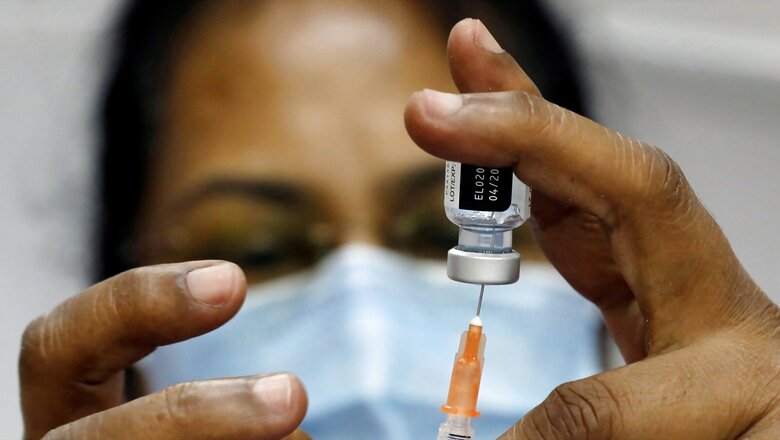
views
Fever, severe body ache, headache, and malaise may not be the only symptoms of general “viral fever” as with the advent of the rainy season, many other tropical illnesses begin to affect people.
Doctors across cities in India are witnessing an increase in cases of illnesses in the outpatient departments that throw up similar symptoms but are different diseases.
While some are related to mosquitoes and sandflies such as dengue, malaria, and chikungunya, others are viral illnesses including influenza A, influenza C, and swine flu. Apart from these illnesses, sporadic spikes are noticed in Covid cases at regular intervals.
“Starting June, we began noticing the fresh onset of acute febrile illnesses (fever) accompanied by upper respiratory tract symptoms such as cough, throat pain or irritation or runny nose, that would usually last for two to three days,” Dr Animesh Arya, unit head, respiratory medicine, at Delhi-based Sri Balaji Action Medical Institute, told News18.com. “Once it enters the family, it is likely to infect everyone but for a short period.”
While the majority of people suffering from the bout of seasonal fever – which is colloquially known as “viral fever” – will get well soon on their own, doctors have started testing for occurrence of mild influenza A, serious influenza C, and swine flu (H1N1) for those who do not improve or show slightly different symptoms.
“People test positive for these illnesses if it’s not usual viral fever. Some cases came out Covid and influenza positive, both,” Arya said. “Now, Covid positives have gone down, whereas dengue diagnosis has gone up along with influenza.”
Doctors, in multiple states, noticed a similar trend.
“While it is difficult many times to differentiate between the symptoms, some features might be helpful,” Dr Sakshi Manchanda, consultant for internal medicine at Medanta in Lucknow, said.
For instance, patients suffering from dengue will have severe body aches apart from fever as symptoms.
A high index of suspicion is required and many times tests for both swine flu and Covid-19 are ordered as they both can lead to severe disease. “Dengue should be tested especially if platelets are low,” she said.
According to Dr Sudha Menon, director, internal medicine, at Fortis, Bengaluru, “A vast majority of the respiratory tract infections are starting in children and subsequently spreading to adults. We are seeing a multitude of viral infections over the last few weeks. Covid, influenza A, and swine flu are common airborne infections, whereas dengue and chikungunya are mosquito-borne. Unfortunately, the initial symptoms of fever, headache, severe body ache, and malaise are common in all viral infections.”
Self-medication leading to severe illness
Medical experts suggest that it is important to take professional advice for any such symptoms rather than delaying treatment or self-prescribing medicines.
According to Dr Manjeeta Nath Das, senior consultant, internal medicine, at Narayana Super Speciality Hospital, based in Haryana’s Gurugram, it is important to evaluate patients on the basis of their symptoms instead of assuming the illness to be seasonal flu.
“Evaluate patients thoroughly. It will give a direction. For instance, if retro-orbital pain and severe backache are there, we suspect dengue. If cough is there, we do Covid testing, and if Covid is negative then we send for H1N1 or swine flu testing,” se said.
A similar concern was pointed out by Menon from Fortis Hospital.
She suggested that fever needs proper evaluation. “We are seeing self-medication and underplaying the symptoms are resulting in patients coming in a serious condition to the hospital. It also results in more spread and loss of valuable time for correct diagnosis and appropriate treatment.”
Cases of flu higher this year
Experts believe that this year, there are more cases of flu-like illness than in the past few years.
“We have seen patients with severe flu-like illnesses. In my experience, flu has resurged after 12-13 years as cases are much more than usual,” Arya said, adding, “Earlier, flu cases would start registering and peaking in the month of November and then February. But this year, cases started coming in June and continued in July and August.”
While a majority of people will get well, he said, those with existing health conditions will be at risk of developing severe disease.
Arya suggests that those with a history of ailments must get flu shots – vaccination against four flu viruses including influenza A, C, and swine flu.
“It reduces the chances of illness and disease by 66 to 70%. People with comorbid conditions such as hypertension, cancer, asthma, chronic pulmonary obstructive disease, and blood disorders among others should consider taking the jab,” he said.
How to differentiate between ongoing illnesses?
Menon explained that sore throat, runny nose, cough, and breathlessness indicate a respiratory infection, whereas eye pain, higher fever, rashes, nausea, and bitter mouth favour dengue-like infections.
Patients who are coming with stuffy nose, cold along with cough and sputum should be checked for swine flu, Manchanda from Medanta said. “Covid is also tested if cough and breathlessness are prominent,” she added.
If patients have mild symptoms, then they are managed on an OPD basis and asked to isolate themselves.
“If breathlessness and severe cough with high fever are present or their oxygen saturation is low, they need admission along with intravenous antibiotics, oxygen, and, if required, respiratory support by BiPap or ventilator,” she said. “Antiviral medicines are also administered for swine flu.”
Read all the Latest Lifestyle News and Breaking News here

















Comments
0 comment